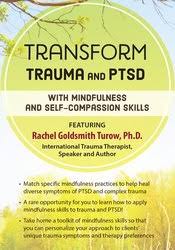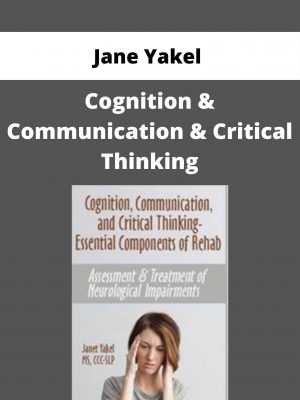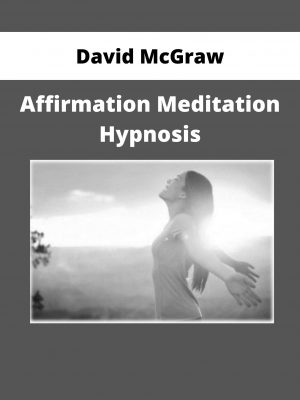Rachel Goldsmith Turow – Transform Trauma and PTSD with Mindfulness and Self-Compassion Skills
$200 Original price was: $200.$75Current price is: $75.
Shopping Instructions:
- DISCOUNT 15% : SHOP15
- Product Delivery: Within 1 – 12 hours after purchase.
Beyond decreasing symptoms of trauma and PTSD, mindfulness skills can provide a lasting foundation for overall health, resilience, and well-being.
Rachel Goldsmith Turow – Transform Trauma and PTSD with Mindfulness and Self-Compassion Skills
- Match specific mindfulness practices to help heal diverse symptoms of PTSD and complex trauma
- A rare opportunity for you to learn how to apply mindfulness skills to trauma and PTSD!
- Discover a toolkit of mindfulness skills so that you can personalize your approach to clients’ unique trauma symptoms and therapy preferences
The multitude of difficulties stemming from trauma – emotional, cognitive, physical, spiritual, and relational-can overwhelm both trauma survivors and you as their clinician. You face a unique constellation of challenges with each client. Luckily, mindfulness practices can provide bountiful avenues towards trauma recovery and posttraumatic growth. Mindfulness skills offer an ideal synthesis of focusing on the “here and now” and healing layers of trauma-related distress. Using specific mindfulness techniques, you can target each client’s unique symptom profile to reduce experiences such as:
- Anxiety
- Avoidance
- Depression
- Hypervigilance
- Dissociation
- Self-criticism, self-blame, and self-hatred
- Intrusions
- Relationship disturbances
Beyond decreasing symptoms of trauma and PTSD, mindfulness skills can provide a lasting foundation for overall health, resilience, and well-being.
Join Dr. Turow, author of Mindfulness Skills for Trauma and PTSD: Practices for Recovery and Resilience (Norton Professional Books, 2017), as she distills her clinical and research expertise to pinpoint specific mindfulness techniques for common responses to trauma. By implementing these skills in your practice, you can confidently guide traumatized clients to tolerate and transform distress, promote bodily relaxation, and shift self-criticism to self-compassion.
- Evaluate the mechanisms through which mindfulness practices can improve PTSD, anxiety, and depression.
- Explore techniques to enhance clients’ sense of safety and control when implementing mindfulness skills to heal after trauma.
- Analyze the scientific research supporting Mindfulness-Based Stress Reduction (MBSR) and Loving Kindness Meditation (LKM) to help clients heal.
- Categorize differences among trauma symptom profiles (e.g., PTSD vs. complex trauma) that can inform how to choose effective mindfulness practices.
- Incorporate specific mindfulness techniques to manage dissociation, hypervigilance, intrusions, avoidance, relationships, and self-criticism.
- Teach mindfulness and self-compassion skills for treating PTSD and related conditions.
- Plan a personalized mindfulness program to nourish yourself when treating traumatized clients to improve your therapeutic presence in-session.
Would you like to receive Rachel Goldsmith Turow – Transform Trauma and PTSD with Mindfulness and Self-Compassion Skills ?
- Relevance for Trauma
- The role of mindfulness and self-compassion in evidence-based therapies for PTSD
- Cognitive Processing Therapy
- Prolonged Exposure
- Non-judgment, metacognition and re-perceiving in the context of trauma-related:
- Shame
- Guilt
- Self-criticism
- Self-blame
- Direct attention to help with trauma related symptoms such as:
- Intrusions
- Anxiety
- Depression
- Dissociation
- Skills to build bodily and emotional awareness after:
- Avoidance
- Numbing
- Dissociation
- Common misconceptions and stumbling blocks
- The role of mindfulness and self-compassion in evidence-based therapies for PTSD
- Mindfulness Practices for Trauma and PTSD
- The scientific evidence for trauma:
- Mindfulness-Based Stress Reduction (MBSR)
- Loving Kindness Meditation (LKM)
- Mindfulness-Based Cognitive Therapy (MBCT)
- Mindfulness-Based Exposure Therapy (MBET)
- How mindfulness and self-compassion decrease psychological symptoms
- Evidence-based specific mindfulness practices for survivors of:
- Interpersonal violence
- Childhood emotional, physical, and sexual abuse
- Combat trauma
- Military sexual trauma
- Disasters
- The scientific evidence for trauma:
- Match Mindfulness & Self-Compassion Skills to Trauma-Related Symptoms
- Mindfulness skills for specific challenges:
- DSM-5® PTSD symptoms
- Depression
- Anxiety
- Substance abuse
- Relationships
- Mindfulness practices for complex trauma and post-trauma worldviews
- Build compassion and self-compassion after trauma
- Mindfulness skills for specific challenges:
- Experiential Training in Mindfulness & Self-Compassion Skills for Trauma and PTSD
- There’s more in this moment: Broaden attention to reduce suffering
- Practice the small stuff to train for the big stuff— from a single breath to feared actions
- Respect and re-appraise intrusions, core beliefs, and self-judgment about having PTSD
- Bodily awareness and relaxation to manage hypervigilance/hyperarousal
- Self-compassion and loving-kindness for trauma,
- PTSD and self-criticism
- Special Considerations when Practicing Mindfulness for Trauma
- Client safety, choice and empowerment with respect to bodily practices
- Non-pathologizing stance to trauma symptoms and treatment obstacles
- Balance neutral mindfulness practices to build skills with practices related to trauma symptoms
- Calibrate exposure to distressing material both within therapy and between sessions
- Mindfulness & Self-Compassion Practices for the Clinician to Prevent Burnout
- Balancing attention to self and other
- Therapist mindfulness and self-compassion practice improves client outcomes
- Modeling mindfulness and discerning self-disclosure
- Prevent burnout; differentiate between empathy, compassion fatigue and compassion satisfaction
Related products
NLP & Hypnosis
NLP & Hypnosis
NLP & Hypnosis
NLP & Hypnosis
NLP & Hypnosis
NLP & Hypnosis












